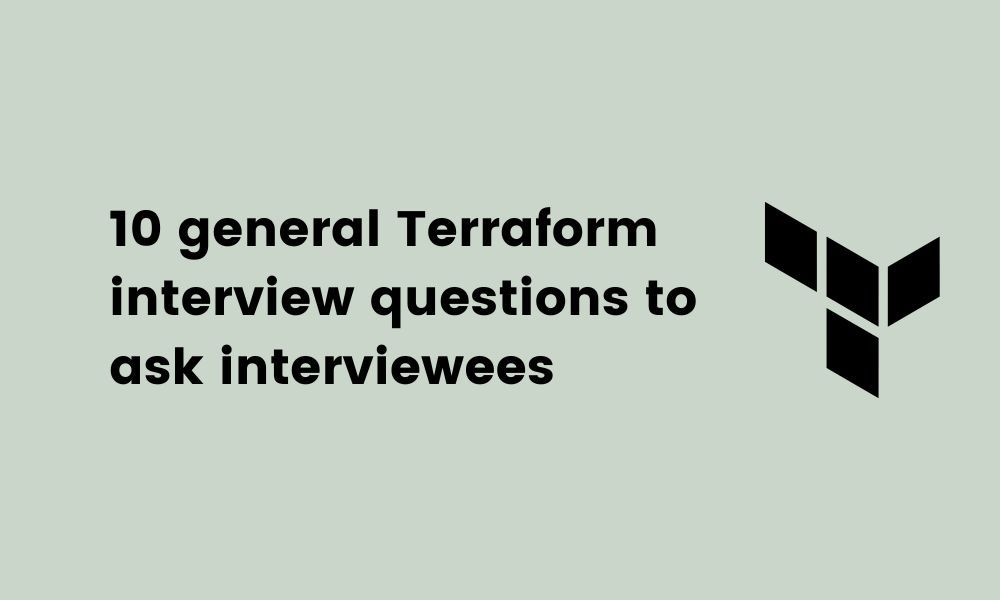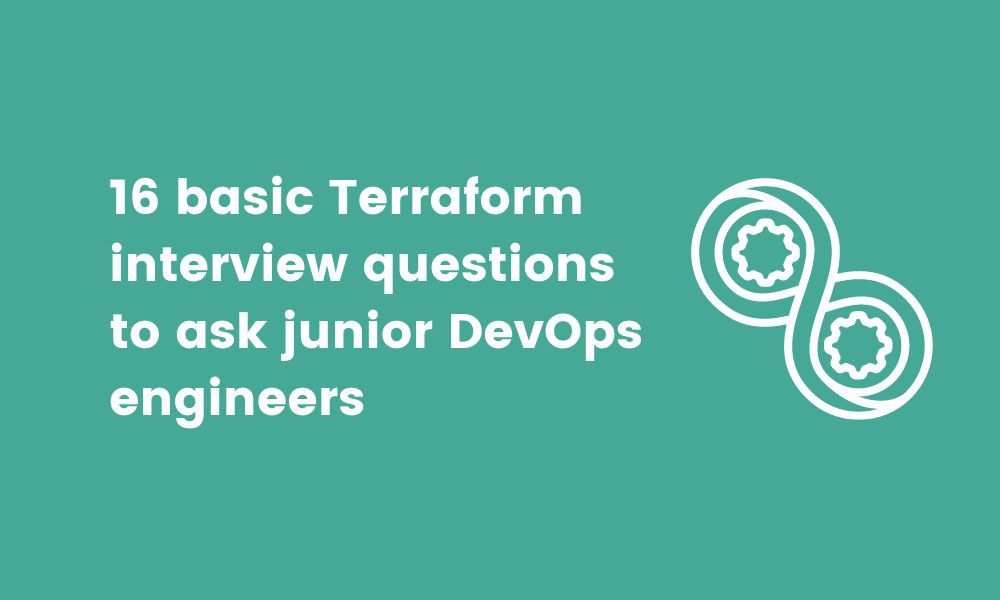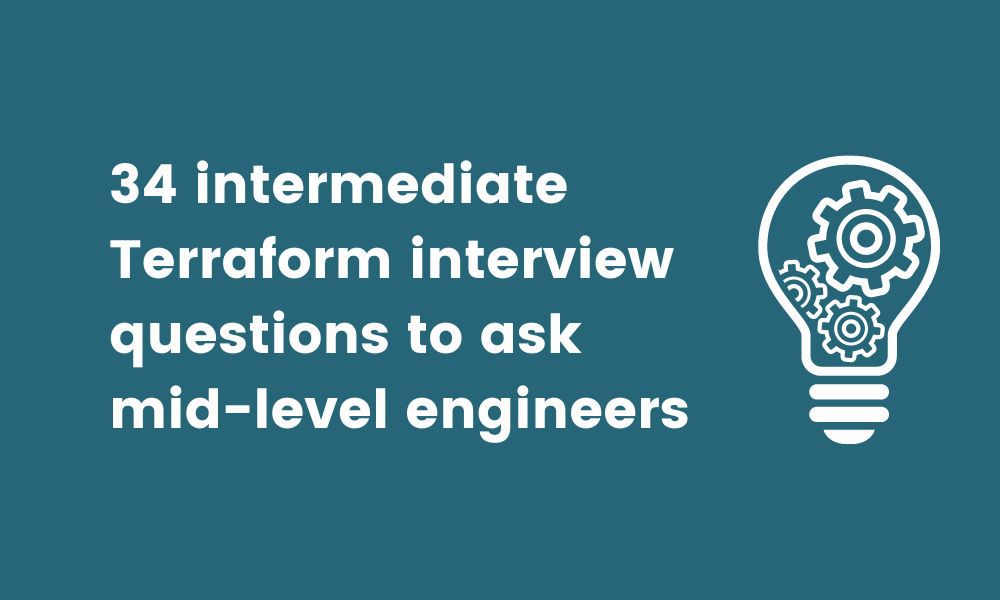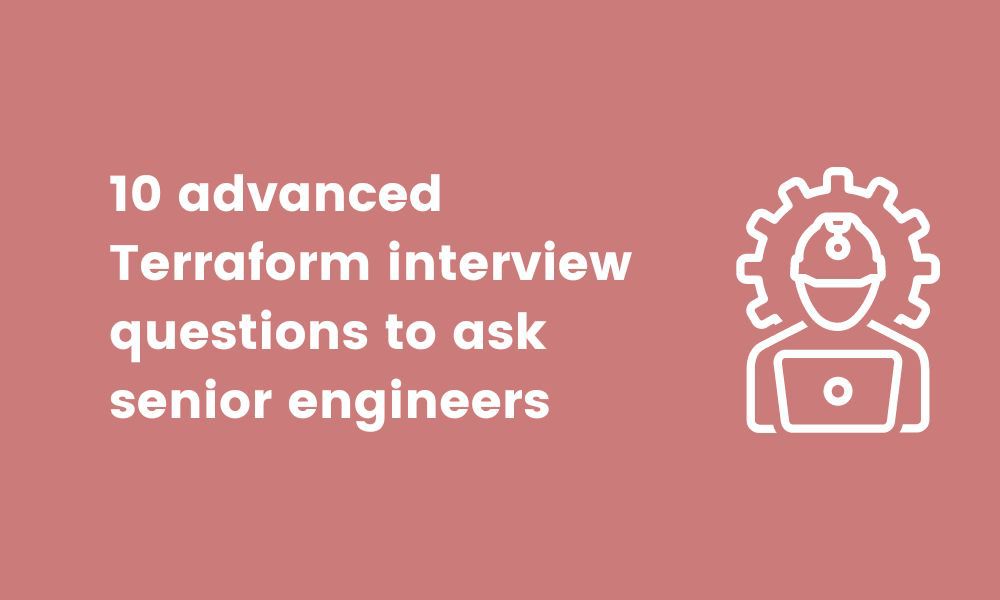70 Terraform interview questions that you can ask while hiring your next DevOps engineer
Defining infrastructure resources, versioning configuration files, reusing them, and sharing them easily are some of the advantages of the Terraform infrastructure as code (IaC) software tool.
If your team needs to alter and improve application infrastructure, Terraform is one of the best options. But can your engineers use Terraform efficiently? Do they have the right expert knowledge, skills, and experience?
If a Terraform expert is missing from your team, you’ll need to find one and accurately evaluate their skills. For this, you can first use a Terraform skills test to shortlist the best applicants.
What’s next? You have to interview your candidates and ask them the right Terraform interview questions.
Find the best Terraform interview questions for easy candidate evaluation just below.
Table of contents
- 10 general Terraform interview questions to ask interviewees
- 5 general Terraform interview questions and answers to evaluate applicants’ responses
- 16 basic Terraform interview questions to ask junior DevOps engineers
- 5 basic Terraform interview questions and answers to appraise your interviewees’ responses
- 34 intermediate Terraform interview questions to ask mid-level engineers
- 5 intermediate Terraform interview questions and answers to evaluate your candidates’ responses
- 10 advanced Terraform interview questions to ask senior engineers
- 5 advanced Terraform interview questions and answers to evaluate candidates’ responses
- 10 tips for evaluating top engineers effortlessly with the right Terraform interview questions
- Recruit an expert DevOps engineer with Terraform using the right Terraform interview questions
10 general Terraform interview questions to ask interviewees
Asking applicants the general Terraform interview questions in this section will enable you to learn more about your candidates’ Terraform experience before you move on to more difficult technical questions. Build your list using these questions:
Describe your experience using Terraform.
Which recent projects have you completed using Terraform?
How do you stay up-to-date with the latest Terraform updates?
Explain how Terraform functions.
Explain the end-user workflow steps for Terraform.
Name a couple of advantages of Terraform state.
Explain what Terraform backend refers to.
Explain what providers are in Terraform.
Explain who is responsible for maintaining providers in Terraform.
Why have you applied for our vacancy?
5 general Terraform interview questions and answers to evaluate applicants’ responses
The five general Terraform interview questions and sample answers in this section will help you evaluate your applicants. Check the answers below to assess their responses.
1. Why have you applied for our vacancy?
Applicants may have various motivations for wanting to join your company and become your next DevOps engineer with Terraform. Consider whether their values align with those of your organization and look for applicants who show that they’re excited about the role.
For example, applicants may be passionate about managing infrastructure or tracking resource changes. They may give examples of other top businesses that use Terraform, such as Slack, Uber, and Twitch, and even talk about some of the exciting projects of your company they’d like to work on.
You can also use our Culture Add test to review your applicants’ values and motivators; use this test after sourcing your candidates and before you interview them.
2. Explain the end-user workflow steps for Terraform.
Knowing how Terraform works is essential for applicants who would be working with it; they should be able to outline the end-user workflow steps for Terraform, which include the following:
Write, where engineers makes changes to code
Init, where they initialize the code for downloading requirements
Plan, where they review any changes and select whether to accept them
Apply, where they accept changes and apply them to the infrastructure
3. Name a couple of advantages of a Terraform state.
Applicants with a general understanding of Terraform should know that a state has various advantages and that it’s a vital Terraform component.
Can they explain that it enables Terraform to map resources to the engineer’s configuration? Are they aware that it also helps engineers monitor metadata? Do they know that a Terraform state can enhance performances, particularly when engineers plan to change complex infrastructures?
4. Explain what providers are in Terraform.
Promising applicants will know what providers are in Terraform. They will be able to explain that providers are Terraform plugins. Can they explain what these plugins do?
For example, candidates may explain that providers permit Terraform to sync with Software as a Service provider, application programming interfaces, and cloud providers. They may give an example to demonstrate how this works, such as the requirement to declare providers in config files if they aim to provision infrastructure in AWS
5. Explain what Terraform backend refers to.
An applicant with general Terraform knowledge should know that Terraform backend refers to a platform where engineers store state snapshots.
They may explain more about this platform and state that the default process for storage works by storing the state as local files on a disk. Candidates may also mention that other backends include remote storage services.
The best insights on HR and recruitment, delivered to your inbox.
Biweekly updates. No spam. Unsubscribe any time.
16 basic Terraform interview questions to ask junior DevOps engineers
Integrating the basic Terraform interview questions in this section into your hiring process is a great way to learn whether your junior applicants are sufficiently skilled for your role. Add these questions to your list to evaluate their skills easily.
Describe your understanding of Terraform in AWS.
Explain the main Terraform features.
Explain what IaC means.
List six handy Terraform commands.
Explain whether callbacks are possible when using Terraform on Azure.
Explain what terraform init is.
Explain what Terraform D is.
Explain why Terraform is handy for DevOps teams.
Explain what null_resource is in Terraform.
What do you understand about the Terraform cloud?
Explain what you understand by Oracle Cloud.
Explain the version controls that Terraform supports other than GitHub.
Are you aware of any Terraform competitors?
Which skills do DevOps engineers need to use Terraform?
Which soft skills do DevOps engineers need when using Terraform?
Which skills are you hoping to improve to enhance your Terraform abilities?
5 basic Terraform interview questions and answers to appraise your interviewees’ responses
The sample answers to five of the basic Terraform interview questions in this section are best used as a guide when appraising your applicants’ responses.
Check out the responses to gauge your junior engineers’ knowledge and skills.
1. Explain the main Terraform features.
Answering this basic Terraform interview question shouldn’t be too challenging for your junior-level applicants. Can they explain that there are four main features of Terraform? These features include:
A console that enables function observation for users
A feature for HCL code translation to JSON
A configuration language feature that permits interpolation
A feature for module tracking, which monitors the number of modules of the infrastructure
2. Explain why Terraform is handy for DevOps teams.
Since Terraform functions with a configuration language similar to JSON (referred to as HashiCorp Configuration Language), its simple syntax makes it easy to use.
Applicants should know that DevOps teams can use the language to build up configurations for infrastructure. They may also explain that DevOps teams can implement these configurations for various clouds and data centers.
3. Which skills do DevOps engineers need to use Terraform?
There are plenty of skills that DevOps engineers use daily to use Terraform effectively. Not only are AWS skills essential, but clean coding skills are also vital.
Your applicants may also mention that DevOps skills are fundamental for engineers who use Terraform.
4. Which soft skills do DevOps engineers need when using Terraform?
Your applicants should be able to list several soft skills that help DevOps engineers complete projects successfully.
Communication skills and problem-solving skills are two examples of important soft skills for Terraform developers; you can evaluate those with our Communication skills test and our Problem-solving test.
Other soft skills your candidates may list include critical thinking, analytical skills, and time management.
5. Which skills are you hoping to improve to enhance your Terraform abilities?
None of your applicants will be absolutely perfect, but they should be working on improving their Terraform abilities.
Whether they need to learn more about how to use AWS with Terraform efficiently or become better DevOps engineers, look for signs that they are taking concrete steps to improve their skills.
For instance, your applicants may be working on Terraform side projects. They may be coding more regularly to perfect their clean coding skills. Whatever skill they want to hone, consider the methods they use to improve it.
34 intermediate Terraform interview questions to ask mid-level engineers
Use some of the 34 intermediate Terraform interview questions below to make the interview process easier.
Select the most relevant questions from the list below based on the open role’s requirements and your team’s needs.
Explain what modules are in Terraform.
Explain what a private module registry is.
Can engineers use Terraform for on-prem infrastructures?
Explain whether Terraform supports multi-provider deployments.
In which situation would you use the Terraform CLI?
What are the main basic CLI commands?
What does Terraform validate do?
What does Terraform apply to do?
What does Terraform plan do?
Name some built-in provisioners that are available in Terraform.
Explain what the salt-masterless provisioner does in Terraform.
Explain what the remote-exec provisioner does in Terraform.
Explain what the puppet provisioner does in Terraform.
Explain what the habitat provisioner does in Terraform.
Explain what the file provisioner does in Terraform.
Explain what the chef provisioner does in Terraform.
Explain what local-exec does in Terraform.
Explain what remote-exec does in Terraform.
Which command would you use to destroy managed infrastructure in Terraform?
Which Terraform applications do you know?
What are the main Terraform architecture components?
What are sub-graphs in Terraform?
What is an expression evaluation in Terraform?
What is a vertex evaluation in Terraform?
What is the graph walk feature in Terraform?
What is the graph builder feature in Terraform?
What is the state manager feature in Terraform?
What is a configuration loader in Terraform?
What is the CLI in Terraform?
When would you use sentinel policies in Terraform?
What is an advisory sentinel enforcement?
What is the soft mandatory sentinel enforcement?
What is the hard mandatory sentinel enforcement?
Which method would you use to store sensitive data?
5 intermediate Terraform interview questions and answers to evaluate your candidates’ responses
The five intermediate Terraform interview questions and sample answers listed below are perfect for checking whether your applicants’ skills match your requirements.
Go through the sample answers to find out what to listen for during interviews.
1. Which command would you use to destroy managed infrastructure in Terraform?
Applicants who have reached mid-level expertise as DevOps Terraform engineers will know which command is required to destroy managed infrastructure in Terraform. They will be able to explain that the following command is best for destroying managed infrastructure: terraform destroy [options] [dir].
2. When would you use sentinel policies in Terraform?
Can your mid-level applicants explain that if they want to implement various policies in Terraform, sentinels are a robust option? There are several examples of how sentinels make policy implementation easier:
Engineers can reinforce resource ownership
Teams can establish mandatory resource tagging
Engineers can restrict the use of modules
3. What is the soft mandatory sentinel enforcement?
Candidates should know that the soft mandatory sentinel enforcement enables the policy to pass except in cases where the administrator specifies an override.
Applicants may also explain that the soft mandatory sentinel enforcement offers a way to define restrictive rules to limit the provisioning of resources in Terraform.
4. What is the hard mandatory sentinel enforcement?
Applicants should be able to explain that the hard mandatory sentinel enforcement means the policy will always be passed, regardless of anything else.
In this sense, engineers cannot override the hard mandatory sentinel enforcement unless they remove it. Applicants may also know that the hard mandatory enforcement is Terraform’s default enforcement level for sentinels.
5. Which method would you use to store sensitive data?
Interviewees should know that Terraform usually needs a set of credentials. Since there are thousands of API keys that GitHub can receive, engineers should know they shouldn’t store these keys directly in Terraform code.
Instead, to store sensitive data, engineers should ensure they use encrypted storage. The encrypted storage makes it simpler to securely store passwords – candidates should know that TLS certificates and SSH keys are two examples of encrypted storage.
10 advanced Terraform interview questions to ask senior engineers
Using some of the 10 advanced Terraform interview questions can help you interview applicants thoroughly if you’re hiring for a senior role.
Explain what Terragrunt is.
Explain what Terragrunt is used for.
What does state file locking mean?
What does “tainted resource” mean?
Explain how you would lock module versions in Terraform.
What do you know about Terraform Core?
Name four responsibilities of the Terraform Core.
Which method would you use to upgrade Terraform plugins?
Which method would you use to control rollbacks?
Which method would you use to import existing resources in Terraform?
Looking for a new hire? Check out our free guide to writing a senior DevOps engineer job description.
5 advanced Terraform interview questions and answers to evaluate candidates’ responses
This section’s answers to five of the key advanced interview questions are ideal for reviewing senior Terraform engineers’ responses. Check them out below.
1. Which method would you use to import existing resources in Terraform?
Engineers can import resources managed by Terraform using a simple command.
Are your applicants aware of the command that facilitates resource importing? The command your candidates may mention when responding to this interview question is terraform import.
2. Which method would you use to upgrade Terraform plugins?
Again, it’s possible to upgrade Terraform plugins with a simple command that makes the process easier.
Do your applicants know that the command to upgrade Terraform plugins is the terraform init command? Are they aware that the -upgrade option is also essential for rechecking releases.hashicorp.com to search for the correct provider versions?
Applicants should also know that the terraform init command will download the provider versions available.
3. Which method would you use to control rollbacks?
Engineers can control rollbacks by recommitting to a previous code version and using it as the current one in a VCS. Applicants should know that it’s crucial to ensure all aspects of the code have been rolled back to the previous code version.
Do your applicants also know that in cases where state files get corrupted, there is a rollback feature they can use to roll back to the newest state? Applicants should know that the state rollback feature is useful for achieving this.
4. Explain how you would lock module versions in Terraform.
Candidates should understand that the Terraform module registry can lock module versions when they use it as a source. They should be aware that the version attribute is essential for this.
Do your candidates know that specifying versions is vital, as is specifying named branches and query strings to lock module versions? Can they also explain that ?ref is the best method to achieve this?
5. Name four responsibilities of the Terraform Core.
Not only should expert engineers know that Terraform Core is compiled in Go and provides an entry point for Terraform users, but they should be aware of Terraform Core’s responsibilities. Some of the main tasks that Terraform Core is responsible for include:
Module and configuration file interpolation
Construction of resource graphs
Communication between plugins with RPC
Resource state management
10 tips for evaluating top engineers effortlessly with the right Terraform interview questions
Preparing for the interview stage can be challenging, but check out these 10 pointers that can help you make the hiring of exceptional engineers an effortless process.
1. List the specific soft skills and values you’re looking for
Make sure you know the specific soft skills and values you’re looking for in your next Terraform engineer. Do this by listing the required skills before asking them to complete a skills assessment or attend an interview.
For example, some of the soft skills you require may include critical thinking or leadership skills; some of the values you’re looking for may include diligence and a growth mindset.
With this list of soft skills and values, you’ll have a benchmark that you can compare your applicants’ soft skills against and determine whether they’re the right fit for your organization. You might also wish to evaluate their Culture Add potential or motivation.
2. Use a skills assessment with several tests
With skills tests, you can check whether your engineers have the right Terraform skills for your organization in the beginning of the recruitment process and concentrate only on your best applicants.
You can combine up to five tests in a single assessment to measure different skills, abilities, and even candidates’ personality traits or cultural alignment.
Obviously, the most important test to include would be a Terraform test, but you can build up on it by combining it with others. For example, to assess whether your candidates’ behaviors and values match those of your business, for example, you could use TestGorilla’s Culture Add test.
You can also assess other soft skills, including problem solving and time management.
Once you’ve got the results, check each candidate’s scores to determine whether they have the right skills for the role. If yes, invite them to an interview.
3. Ask applicants about their Terraform experience
As you get started with the interview, ask your candidates about their Terraform experience first.
For example, you may want to ask applicants for how many years they have used Terraform. Or you may be interested in specific projects they have completed using this tool. Or you might want to know whether they have worked with larger or smaller teams in the past.
Ask applicants about their Terraform experience to begin the interview and get the conversation going. Take note of applicants who have similar experience to what you’re looking for.
However, it’s not always a red flag if your applicants’ experience doesn’t completely align with your business or role: it’s just as important, if not more, to check whether your applicants are motivated to learn and adapt to the role.
4. Tell interviewees what’s unique about your business
The interview shouldn’t be a one-sided process: Exchanging information is critical.
Take the chance to ask whether applicants have researched your organization and add to what they already know by describing its mission and core values.
Mention some of the unique projects your teams are working on to give applicants more details about your business and build on the job description that first attracted them. Leave a few minutes for questions at the end of the interview and tell them you remain available for questions per email, if they have any.
This shows that you care about applicants and that you’re genuinely interested in creating a positive candidate experience.
5. Ask your applicants questions that match their skill level
You may be hiring a senior-level engineer or a junior one. Consider this when choosing the right Terraform interview questions to ask your applicants.
If you’re recruiting a senior-level engineer, there’s no point in asking them basic Terraform interview questions. This approach will defeat the objective of getting to know more about your applicants’ senior-level skills.
Ensure you select the questions that match your applicants’ skill level and experience. This method will ensure you get an accurate understanding of your candidates’ abilities.
6. Ask a mixture of behavioral, situational, technical, and soft skill questions
Each role requires a range of skills, so choose a variety of interview questions when creating your list. Include behavioral, situational, technical, and cognitive questions to understand your applicants’ abilities.
For example, you may ask technical questions about Terraform Core or situational questions about rollbacks to learn how applicants act in complex situations and whether they’re ready to tackle the challenges they might face in this role.
7. Make structured interviews a priority when asking Terraform interview questions
Structured interviews vs. unstructured interviews: Which should you choose?
At TestGorilla, we think this is an easy choice. You can easily collate the results of structured interviews and spend less time working your way through your notes.
Even though you’ll ask candidates a variety of questions (such as behavioral, situational, and technical), ensure you ask them the same set of questions in the same order.
8. Ask applicants about their portfolio
If you need additional information about your applicants, consider taking a look at their portfolios. Check them before the interview stage, and be ready to discuss them with candidates and ask them additional questions about their work, including their use of Terraform.
Observe the way applicants talk about their past projects and whether they show excitement or whether they act lackadaisical.
9. Take note of applicants who have the right skills
As you work through the Terraform interview questions and your applicants respond, take note of applicants who have the required skills. If note-taking is part of your process, give candidates a heads-up and tell them to expect note-taking during the interview
10. Use the assessment and interview results to make a hiring decision
Once you’ve wrapped up all the interviews, it’s time to check the notes you’ve taken and share them with your hiring team.
At the same time, ensure you check again applicants’ results from the Terraform test and other assessments to have the full picture. With all the information you’ve got, hiring a top candidate will now be easy.
Bonus tip: Skills testing is ideal for designing the perfect training program, too
Did you know that you can also use skills tests to design onboarding and training programs for your next hires?
It’s a simple and effective method to benchmark your applicants’ abilities. All that’s required of your hiring team is to check which of your applicants’ skills need a little boost. Our skills tests will give you the data you need to arrange the specific course for each person and help them upskill.
Use the test data to also match your new hire with a mentor who has already mastered the skills they need to work on. It’s as simple as checking the automated test results and adapting your onboarding process to your applicants’ needs.
Recruit an expert DevOps engineer with Terraform using the right Terraform interview questions
Recruiting DevOps engineers with strong Terraform skills can be challenging, but this doesn’t mean you can’t simplify the process. Skill testing with TestGorilla is one method that will help: Just select five skills tests to create your assessment and invite applicants to complete it.
Remember to use a Terraform skills test after sourcing DevOps engineers for your team, and then proceed with interviewing your best applicants.
To prepare for the interview stage, you can use the list of Terraform interview questions from this article.
Combining these two methods makes it easier to hire the right talent. Use TestGorilla to streamline hiring and find the best Terraform engineer for your team.
You've scrolled this far
Why not try TestGorilla for free, and see what happens when you put skills first.



















